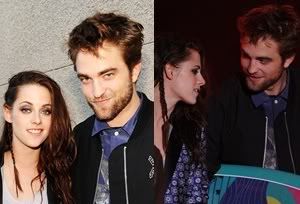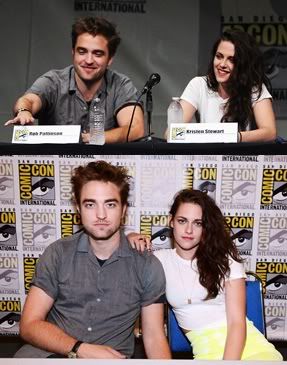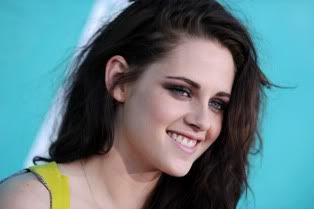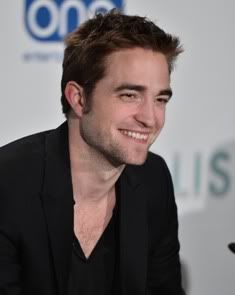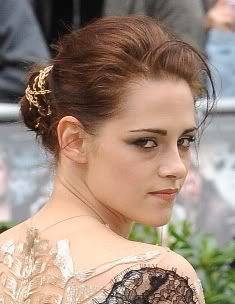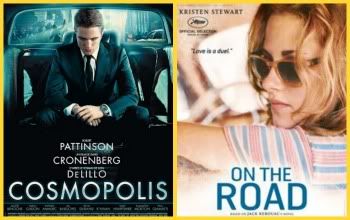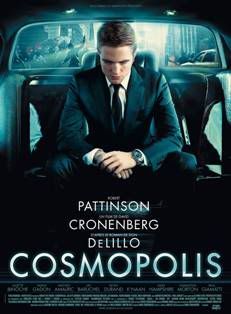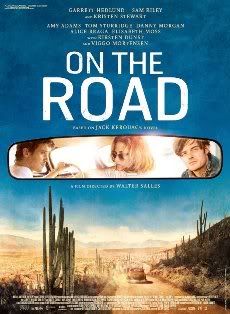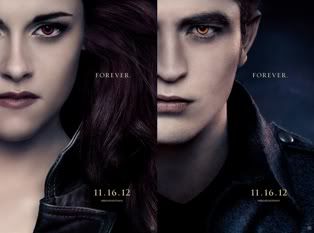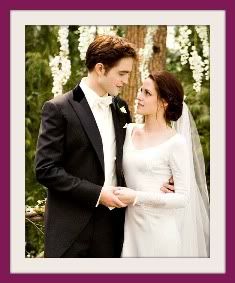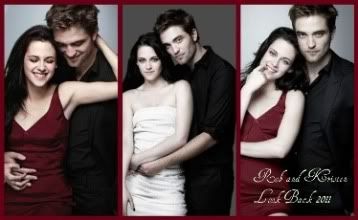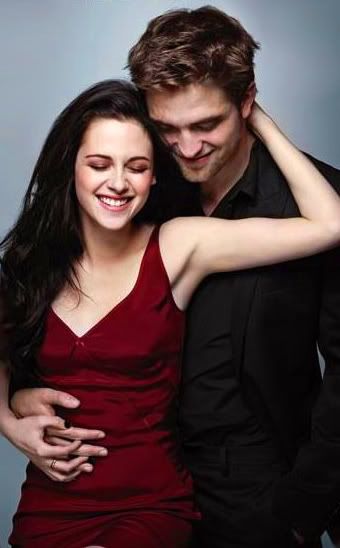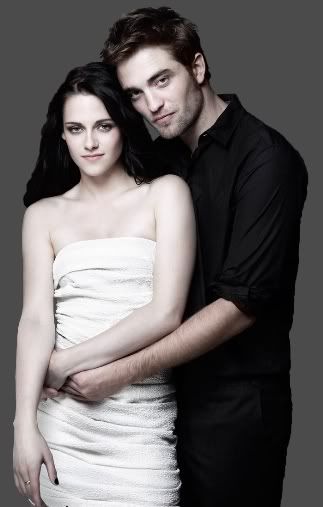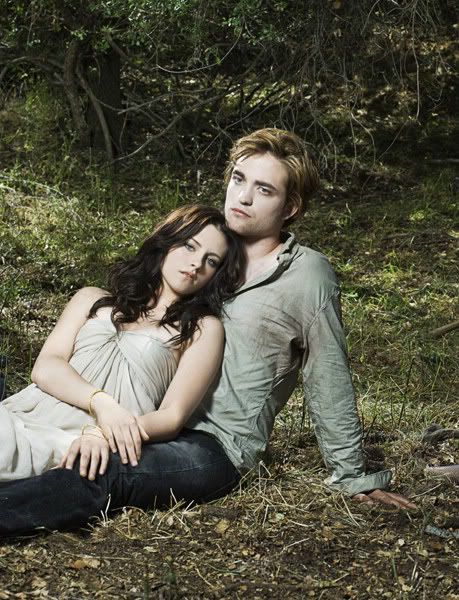Film.com New Moon the second chapter of The Twilight Saga, begins with every teen girl's favorite vampire, Edward Cullen (Robert Pattinson), breaking his beloved Bella's heart, sending her on a downward spiral she only narrowly survives. I sat down with Pattinson recently to discuss the movie, sudden fame, and why he relates so well to Edward.
Cole Haddon: In New Moon, Edward Cullen, after having personally exiled himself from Bella's life, spends most of the story ... well, not in it. Except for visions Bella (Kristen Stewart) has, that is. Did that leave you feeling disconnected from your cast mates at all?
Robert Pattinson: Those scenes, [the visions], were the hardest scenes. They weren't really at the time, but after I saw the first cut of the movie, [the filmmakers] changed them quite a bit in the editing room and with ADR. It's not [technically] Edward [either]. It's a manifestation of Bella's loneliness and desperation. As for being alone, I've always felt a little bit aloof as the character, throughout the whole series. I think that's how he is, so I didn't feel any different.
CH: Did you agree with the decision to make Edward appear as a vision to Bella, rather than just a voice as it is in the novel?
RP: I was always very worried about that. Even before we started shooting, people were asking questions and saying, "Oh, are you worried that people will think there's not enough Edward in it?" But he's not in the book. I was [more] worried that it was just going to be random scenes. There was talk, at the beginning, of showing his backstory in South America, going around moping [after his breakup with Bella]. That would have been terrifying for me, and I think it would have been catastrophic for the film as well. I fought as far as I could to keep it as limited as possible, mainly because it just doesn't happen in the book. But then, at the same time, it's scary just to do a voice-over, because it could end up being very cheesy.
CH: How did you fight for that?
RP: I just talked to [director] Chris [Weitz]. He wasn't ever going to just do things for the sake of doing them. He was always on the side of the story. Even since it's been edited, there were loads and loads of the apparition sequences cut out. A lot of them Chris cut out without me saying. But, when I was doing ADR, I was saying, "It will be more interesting and mystical if you cut out more of these shots. It becomes more eerie and more realistic, the less of these visions you have." Just having head-on shots makes it something other than a vision. It becomes a superimposed image, which is not interesting.
CH: Talk about the past year or so of your life. The sudden celebrity. The paparazzi. How are you dealing with things, and do you find yourself more comfortable with it all now?
RP: I guess it's inevitable that you become more comfortable. You still fight against some things. There's nothing really scary about the franchise itself. I like all the people I work with. I generally have very few disagreements about the script or anything while we're doing it, especially on New Moon. It just seemed so relaxed and easy. I've been on three different sets since January 14. I've had, like, three days off. I'm going to be on set all next year as well. I don't know what doing errands and things is really like because I haven't had a sustained period of time where I've been off. I don't know how it's really changed. I still feel like I'm pretty much exactly the same, which is maybe not a good thing.
CH: I think it's fair to say the franchise has made you a bankable leading man. How has that changed your career, and where do you want to be in five years?
RP: I don't know. I've only done one movie outside of the series, which was Remember Me. That's going to be out sometime next year. But, even that I did with the same studio. I'm still a little bit blind as to what my actual economic viability is, outside of the series, but it's definitely different. You get offered stuff that you never would have dreamed of getting offered before, but that's scary as well because you don't have to audition for anything. You're just like, "I don't want to do a movie just because it gets made." It's a scary situation to be in, in a lot of ways. You have to question yourself a lot more. Before Twilight, I did any movie that I got and tried to make the best of it afterwards. Now, you're expected to come into the movie and provide not only economic viability, but a performance as well. People are like, "You can't just mess around. We're employing you to be a star and an actor." It's difficult, and it's scary.
CH: But isn't that what everyone dreams about when they start out in the movie business?
RP: You do. When you haven't gotten a big movie behind you and you're not bankable, everyone is like, "He's not bankable enough," so you can't get the roles that you want to get. And then, when you do, especially with a movie like this where there's a perceived specific audience, people start thinking, "Oh, you need to get in with this audience. You need to do this or that. You need to look a certain way." There are some limitations to it. Whereas when no one is watching your movies and you get a part, you can do whatever the hell you want. That's just the way it is. So, there are good and bad points, either way.
CH: Let's get back to New Moon. What was it like watching Taylor Lautner transform his body so dramatically for the role of Jacob?
RP: I didn't see Taylor until just a little bit before we started shooting, so when he came back, I had the same reaction as everybody else. I was like, "Now I have to go to the gym."
CH: And what was it like inviting him into the dynamic you share with Kristen on-screen? Developing that romantic triangle?
RP: It was weird because I hardly did any scenes with Taylor. We just did the scenes at the beginning, and the scenes at the end, and he had his entire storyline develop without me being around, which is interesting because I had no idea where his performance was going. It wasn't really a competition or anything. It was independent. Whereas in Eclipse, [which we've already shot], we did scenes together, all the time, with Bella. It really shows the dynamic in [the next] film.
CH: And what was it like to shoot the breakup scene between Edward and Bella? Fans had a lot of expectations.
RP: There's something weird about it. One of the main things I felt doing that, and what really helped, was people's anticipation of the movie, and the fans of the series' idea about what Bella and Edward's relationship is and what it represents to them. It's some kind of ideal for a relationship. And so, just playing a scene where you're breaking up the ideal relationship, I felt a lot of the weight behind that. Also, it took away a fear of melodrama. It felt seismic, even when we were doing it. It was very much like the stepping out into the sunlight scene, at the end. You could really feel the audience watching, as you're doing it. It was a strange one to do.
CH: You've shot three movies in the series so far, which is a lot of time to spend with a character. What personality traits do you share with Edward?
RP: I guess stubbornness, in some ways, about some things. He's pretty self-righteous. I get quite obsessive about things, and possessive as well.
CH: With what?
RP: I have very, very specific ideas about how I want to do my work and how I want to be perceived, to the point of ridiculousness sometimes. I don't listen to anyone else. That's why I don't have a publicist or anything. I can't stand it if someone is trying to tell me to do something, which is maybe a mistake sometimes. I like being meticulous, and it's quite difficult, as an actor, to have that much control. The good thing about the Twilight series is that it does give you a lot more control over little things, which I want to have. I'm a control freak about it.
CH: Do you appreciate Edward more with each movie?
RP: When I read New Moon, it gave me ideas about how to play him in the first film. It's the one I connected to the most, and the one that humanized Edward for me the most, as well. In the first one, he still does remain, from beginning to end, an idealistic character. But, in the second one, he makes a mistake that's acknowledged by everybody, including himself. Also, he is totally undermined by more powerful creatures, and he's undermined emotionally by people as well. That's what humanized it. Since I read that book, I always liked him as a character, and I've tried to play that same feeling throughout the films. He's the hero of the story that just refuses to accept that he's the hero, and I think that's kind of admirable. via ROBsessed
Cole Haddon: In New Moon, Edward Cullen, after having personally exiled himself from Bella's life, spends most of the story ... well, not in it. Except for visions Bella (Kristen Stewart) has, that is. Did that leave you feeling disconnected from your cast mates at all?
Robert Pattinson: Those scenes, [the visions], were the hardest scenes. They weren't really at the time, but after I saw the first cut of the movie, [the filmmakers] changed them quite a bit in the editing room and with ADR. It's not [technically] Edward [either]. It's a manifestation of Bella's loneliness and desperation. As for being alone, I've always felt a little bit aloof as the character, throughout the whole series. I think that's how he is, so I didn't feel any different.
CH: Did you agree with the decision to make Edward appear as a vision to Bella, rather than just a voice as it is in the novel?
RP: I was always very worried about that. Even before we started shooting, people were asking questions and saying, "Oh, are you worried that people will think there's not enough Edward in it?" But he's not in the book. I was [more] worried that it was just going to be random scenes. There was talk, at the beginning, of showing his backstory in South America, going around moping [after his breakup with Bella]. That would have been terrifying for me, and I think it would have been catastrophic for the film as well. I fought as far as I could to keep it as limited as possible, mainly because it just doesn't happen in the book. But then, at the same time, it's scary just to do a voice-over, because it could end up being very cheesy.
CH: How did you fight for that?
RP: I just talked to [director] Chris [Weitz]. He wasn't ever going to just do things for the sake of doing them. He was always on the side of the story. Even since it's been edited, there were loads and loads of the apparition sequences cut out. A lot of them Chris cut out without me saying. But, when I was doing ADR, I was saying, "It will be more interesting and mystical if you cut out more of these shots. It becomes more eerie and more realistic, the less of these visions you have." Just having head-on shots makes it something other than a vision. It becomes a superimposed image, which is not interesting.
CH: Talk about the past year or so of your life. The sudden celebrity. The paparazzi. How are you dealing with things, and do you find yourself more comfortable with it all now?
RP: I guess it's inevitable that you become more comfortable. You still fight against some things. There's nothing really scary about the franchise itself. I like all the people I work with. I generally have very few disagreements about the script or anything while we're doing it, especially on New Moon. It just seemed so relaxed and easy. I've been on three different sets since January 14. I've had, like, three days off. I'm going to be on set all next year as well. I don't know what doing errands and things is really like because I haven't had a sustained period of time where I've been off. I don't know how it's really changed. I still feel like I'm pretty much exactly the same, which is maybe not a good thing.
CH: I think it's fair to say the franchise has made you a bankable leading man. How has that changed your career, and where do you want to be in five years?
RP: I don't know. I've only done one movie outside of the series, which was Remember Me. That's going to be out sometime next year. But, even that I did with the same studio. I'm still a little bit blind as to what my actual economic viability is, outside of the series, but it's definitely different. You get offered stuff that you never would have dreamed of getting offered before, but that's scary as well because you don't have to audition for anything. You're just like, "I don't want to do a movie just because it gets made." It's a scary situation to be in, in a lot of ways. You have to question yourself a lot more. Before Twilight, I did any movie that I got and tried to make the best of it afterwards. Now, you're expected to come into the movie and provide not only economic viability, but a performance as well. People are like, "You can't just mess around. We're employing you to be a star and an actor." It's difficult, and it's scary.
CH: But isn't that what everyone dreams about when they start out in the movie business?
RP: You do. When you haven't gotten a big movie behind you and you're not bankable, everyone is like, "He's not bankable enough," so you can't get the roles that you want to get. And then, when you do, especially with a movie like this where there's a perceived specific audience, people start thinking, "Oh, you need to get in with this audience. You need to do this or that. You need to look a certain way." There are some limitations to it. Whereas when no one is watching your movies and you get a part, you can do whatever the hell you want. That's just the way it is. So, there are good and bad points, either way.
CH: Let's get back to New Moon. What was it like watching Taylor Lautner transform his body so dramatically for the role of Jacob?
RP: I didn't see Taylor until just a little bit before we started shooting, so when he came back, I had the same reaction as everybody else. I was like, "Now I have to go to the gym."
CH: And what was it like inviting him into the dynamic you share with Kristen on-screen? Developing that romantic triangle?
RP: It was weird because I hardly did any scenes with Taylor. We just did the scenes at the beginning, and the scenes at the end, and he had his entire storyline develop without me being around, which is interesting because I had no idea where his performance was going. It wasn't really a competition or anything. It was independent. Whereas in Eclipse, [which we've already shot], we did scenes together, all the time, with Bella. It really shows the dynamic in [the next] film.
CH: And what was it like to shoot the breakup scene between Edward and Bella? Fans had a lot of expectations.
RP: There's something weird about it. One of the main things I felt doing that, and what really helped, was people's anticipation of the movie, and the fans of the series' idea about what Bella and Edward's relationship is and what it represents to them. It's some kind of ideal for a relationship. And so, just playing a scene where you're breaking up the ideal relationship, I felt a lot of the weight behind that. Also, it took away a fear of melodrama. It felt seismic, even when we were doing it. It was very much like the stepping out into the sunlight scene, at the end. You could really feel the audience watching, as you're doing it. It was a strange one to do.
CH: You've shot three movies in the series so far, which is a lot of time to spend with a character. What personality traits do you share with Edward?
RP: I guess stubbornness, in some ways, about some things. He's pretty self-righteous. I get quite obsessive about things, and possessive as well.
CH: With what?
RP: I have very, very specific ideas about how I want to do my work and how I want to be perceived, to the point of ridiculousness sometimes. I don't listen to anyone else. That's why I don't have a publicist or anything. I can't stand it if someone is trying to tell me to do something, which is maybe a mistake sometimes. I like being meticulous, and it's quite difficult, as an actor, to have that much control. The good thing about the Twilight series is that it does give you a lot more control over little things, which I want to have. I'm a control freak about it.
CH: Do you appreciate Edward more with each movie?
RP: When I read New Moon, it gave me ideas about how to play him in the first film. It's the one I connected to the most, and the one that humanized Edward for me the most, as well. In the first one, he still does remain, from beginning to end, an idealistic character. But, in the second one, he makes a mistake that's acknowledged by everybody, including himself. Also, he is totally undermined by more powerful creatures, and he's undermined emotionally by people as well. That's what humanized it. Since I read that book, I always liked him as a character, and I've tried to play that same feeling throughout the films. He's the hero of the story that just refuses to accept that he's the hero, and I think that's kind of admirable. via ROBsessed


